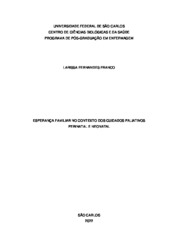| dc.contributor.author | Franco, Larissa Fernandes | |
| dc.date.accessioned | 2022-03-24T20:52:19Z | |
| dc.date.available | 2022-03-24T20:52:19Z | |
| dc.date.issued | 2022-02-24 | |
| dc.identifier.citation | FRANCO, Larissa Fernandes. Esperança familiar no contexto dos cuidados paliativos perinatal e neonatal. 2022. Dissertação (Mestrado em Enfermagem) – Universidade Federal de São Carlos, São Carlos, 2022. Disponível em: https://repositorio.ufscar.br/handle/ufscar/15747. | * |
| dc.identifier.uri | https://repositorio.ufscar.br/handle/ufscar/15747 | |
| dc.description.abstract | The present study is theoretical, of a reflective nature, with the objective of mapping scientific evidence on family hope in the context of perinatal and neonatal palliative care and weaving reflections on the subject. To this end, a scoping review was developed, with the intention of identifying what is already presented in the literature, followed by notes in the direction of contributing to the conceptual densification and practical renewal of peri and neonatal PC in terms of hope. Searches were performed in the following databases: CINAHL, PubMed and PsycINFO following the JBI recommendations. A total of 466 articles were identified, 22 excluded for being duplicates and 393 after reading the title and abstract for not meeting the objectives of the study. For full reading, 51 articles were selected, of which ninewere unavailable/or with restricted access and 29 were excluded for not answering the research question; thus 13 articles were selected for this study. The study reveals two main milestones for hope: difficulty in handling “uncertainty” in the face of diagnosis and information, which we categorize as ANNOUNCEMENT; the other relates to the later moment of “certainty” in the face of the intention to relate and experience parenting, called LINKING and CARE. It was identified that the recognition of hope as a structuring of confrontation and part of autonomy is fundamental and was disregarded according to studies analyzed in this review. Hope is directly related to autonomy, the more the former, the more the latter, the same happens in the reverse situation; it is dependent on the social relationships and meanings attributed for it to be established. When faced with situations, environments and professionals that culminate in hopelessness, autonomy is weakened, and they become passive in the process. Hope is, therefore, a force capable of directing parents on the path of uncertainties experienced through the diagnosis of a condition that compromises their child's life, and health professionals are fundamental elements to keep them moving, acting as support. | eng |
| dc.description.sponsorship | Coordenação de Aperfeiçoamento de Pessoal de Nível Superior (CAPES) | por |
| dc.language.iso | por | por |
| dc.publisher | Universidade Federal de São Carlos | por |
| dc.rights | Attribution-NonCommercial-NoDerivs 3.0 Brazil | * |
| dc.rights.uri | http://creativecommons.org/licenses/by-nc-nd/3.0/br/ | * |
| dc.subject | Cuidados paliativos | por |
| dc.subject | Esperança | por |
| dc.subject | Neonatal | por |
| dc.subject | Perinatal | por |
| dc.subject | Pais | por |
| dc.subject | Pesquisa em enfermagem | por |
| dc.subject | Palliative care | eng |
| dc.subject | Hope | eng |
| dc.subject | Parents | eng |
| dc.subject | Nursing research | eng |
| dc.title | Esperança familiar no contexto dos cuidados paliativos perinatal e neonatal | por |
| dc.title.alternative | Family hope in the context of perinatal and neonatal palliative care | eng |
| dc.type | Dissertação | por |
| dc.contributor.advisor1 | Wernet, Monika | |
| dc.contributor.advisor1Lattes | http://lattes.cnpq.br/6056127658896265 | por |
| dc.description.resumo | O presente estudo é teórico, de natureza reflexiva, sob o objetivo de mapear evidências científicas sobre esperança familiar no contexto dos cuidados paliativos perinatal e neonatal, e tecer reflexões acerca da temática. Para tanto, foi desenvolvida uma scoping review, com intenção de identificar o que já está apresentado na literatura, seguida por apontamentosna direção de contribuir para o adensamento conceitual e renovação prática dos CP peri e neonatal no que tange àesperança. As buscas foram realizadas nas bases de dados: CINAHL, PubMed e PsycINFO seguindo as recomendações do JBI. Foram identificados 466 artigos, 22 excluídos por serem duplicados e 393 após leitura do título e resumo, por não atenderem aos objetivos do estudo. Para leitura na íntegra foram selecionados 51 artigos, dos quais noveencontravam-se indisponíveis/ ou com acesso restrito, e 29 foram excluídos por não responderem àpergunta de pesquisa; dessa forma, 13 artigos foram selecionados para este estudo.O estudo revela dois marcos principais para a esperança: dificuldade de manejar a “in’certeza” diante do diagnóstico e informações, o qual categorizamos de ANUNCIAÇÃO; o outro relaciona-se com o momento posterior de “certeza” diante da intenção de se relacionar e viver a parentalidade, denominado VINCULAÇÃO e CUIDADO. Identificou-se que o reconhecimento da esperança enquanto estruturante de enfrentamento e integrante da autonomia é fundamental e esteve desconsiderado de acordo com estudos analisados nesta revisão. A esperança é de relação direta com a autonomia, quanto mais aquela, mais esta, e o mesmo acontece na situação inversa:é dependente das relações sociais e significados atribuídos para que se estabeleça. Quando deparados com situações, ambientes e profissionais que culminam na desesperança, a autonomia é fragilizada e tornam-se passivos no processo. A esperança é, portanto, uma força capaz de direcionar os pais no caminho das incertezas vivenciadas mediante o diagnóstico de uma condição que compromete a vida de seu filho, e os profissionais de saúde são elementos fundamentais para mantê-los em movimento atuando como suporte. | por |
| dc.publisher.initials | UFSCar | por |
| dc.publisher.program | Programa de Pós-Graduação em Enfermagem - PPGEnf | por |
| dc.subject.cnpq | CIENCIAS DA SAUDE::ENFERMAGEM::ENFERMAGEM PEDIATRICA | por |
| dc.description.sponsorshipId | 88887.627502/2021-00 | por |
| dc.publisher.address | Câmpus São Carlos | por |
| dc.contributor.authorlattes | http://lattes.cnpq.br/7410170114609887 | por |


